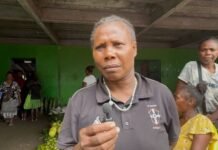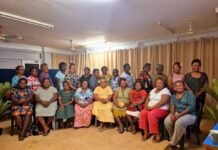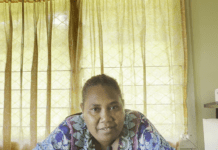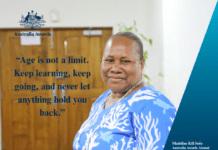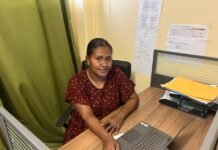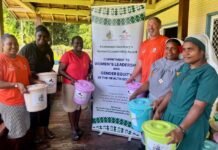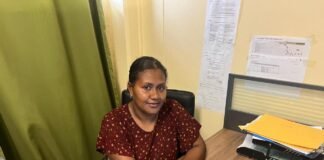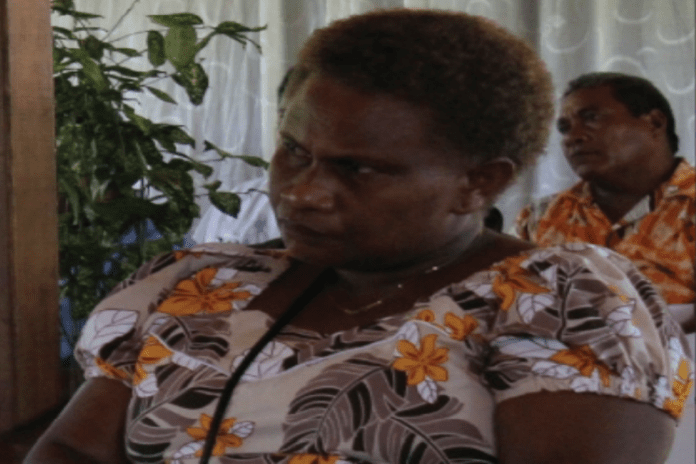
BY ROMULUS HUTA
MEET Rose Liata. She is the only local woman politician in the Malaita Provincial Assembly.
She represents Ward 13 Sulufou/Kwarade in Baegu/ Asifola Constituency in the Northern Region.
Hailing from a male-dominated society that has been practicing a patrilineal system, Mrs. Liata’s entry into politics was not an easy one.
She found it a bit tough at first but slowly makes her mark as soon as she gets elected into the local government in the last election.
As the sole woman female representative in the Malaita Provincial government, Mrs. Liata said she often finds difficulty in working with men at first.
“But as I go along with them, in three months, I managed to get along very well with them doing discussions, going to meetings, and I tried to gain my confidence to cope up with them.”
Mrs. Liata said she now feels comfortable working with men and believes in one thing as a way forward – working together. “As someone who just got into politics, it is a totally new environment and also comes with greater challenge and responsibility,” she told Solomon Women.
Mrs. Liata said it’s only months since getting elected and she is still in learning mode with the help of her male colleague politicians to face challenges that may cross the path and deal with responsibilities bestowed upon her by the people who voted her in.
“I don’t isolate myself from my male colleague. I work closely with them in various areas and they helped me a lot with their discussions. Anything that I want to know about, I always ask them and they help me out.
“I also find it very interesting when working with them although they are all men dominating in the provincial assembly.”
She added that her male colleagues have been very supportive and she is also pleased that they too have concerns for women’s issues.
“My male colleagues contribute a lot in issues facing women set down for discussions. I like their broad thinking.”
Currently, Mrs. Liata is the Minister of Community Health and Medical Services.
She was called in by Premier Peter Ramohia to take up the portfolio though she was in the other camp during the premier’s election.
The female MPA described the opportunity to take up the Ministerial portfolio as a good one.
“The staff of my Ministry have been supportive though I’m new in this. I would also acknowledge our Provincial Secretary, who has been advising me a lot.”
In describing what brought her into politics, she said her passion to help her people pushed her to run for the local government election.
“After several years working with my people back at the community level, I have seen the need and developed the passion to help our people. That’s what got me into politics.”
Asked how she managed to make it through the election, she said the women in their area stood for her and supported her to her victory.
“When I went into election, I received more support not from women only but also men. 80% of women supported me and 20% from men.”
She also paid credit to her husband for the continuous support he plays to get her up there.
“Before I contested the election, my spouse really worked hard and put more effort into this. He contributed a lot and keeps standing tall behind everything I did in the election.
“My spouse is very interested in Politics and advises me a lot. I would say he’s my political adviser.”
The MPA for Sulufou/Kwarade also shared her view on the issue of women in parliament.
“Most of our women would like to participate and go into politics a lot. But from my view, if a woman wants to go into politics, her personality and integrity must be well taken into account. Your husband must also be someone who will work with you and must not have a bad record. I think that is important.
“It’s true that our women are eager to go into parliament but the thing is, let’s not wait until the last minute to start our campaigns.
“We have to go down there and stay a few more years to be with our people. And it’s down there that the people will assess us and know who we are. I’m speaking from my own experience,” she said.
Coming from a patrilineal society, Mrs. Liata said, “Women do not undermine the status of men when entering politics. To say women entering politics to undermine men’s status is incorrect.
“I will mark out clearly here that in tradition, according to the patrilineal system where we practice, men have the right to lead and women are confined to the kitchen, doing the cooking for the children.
“But I will put it in a way to understand that if a woman is to become a leader, she is there to represent us and not for her to undermine or override our culture,” she concludes.






